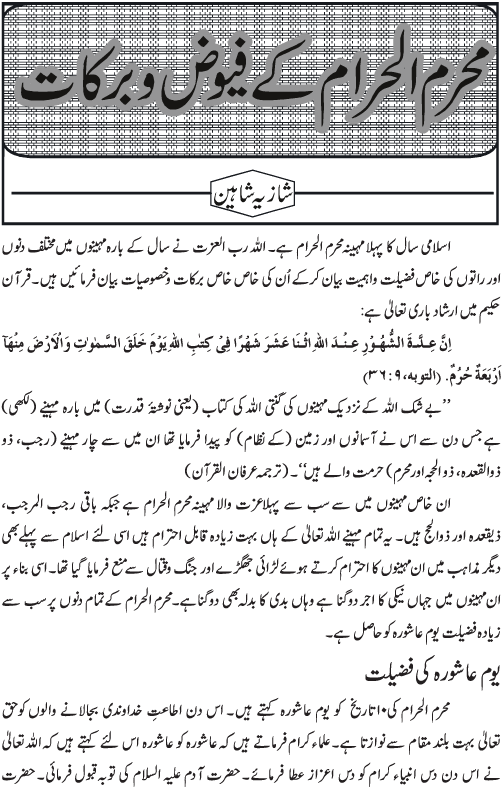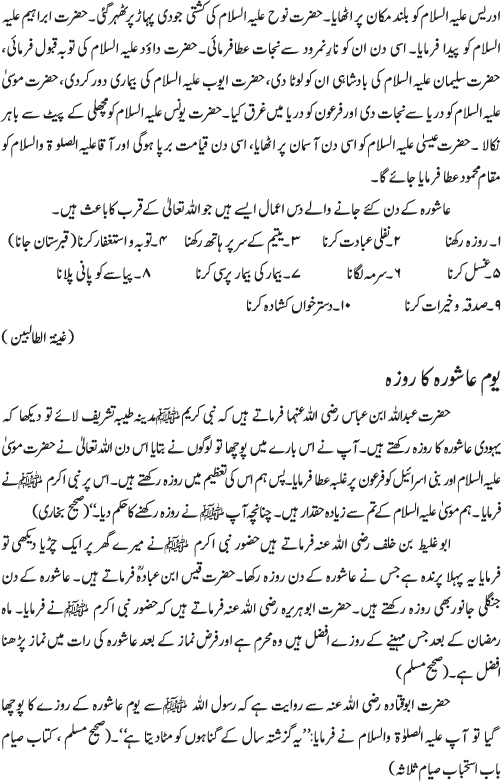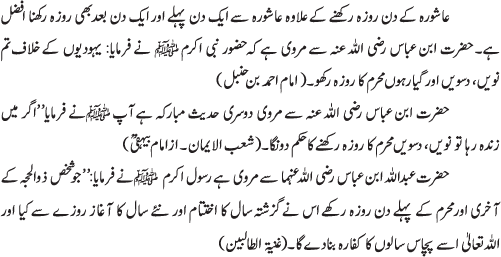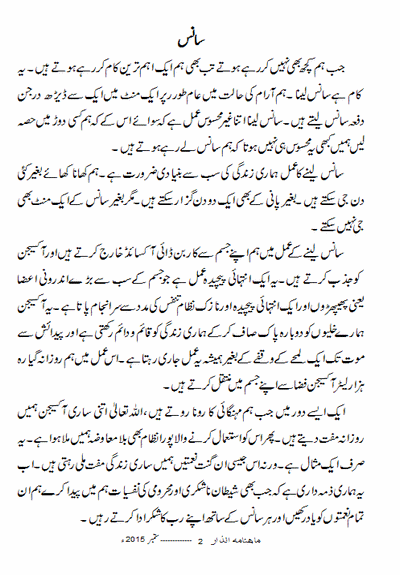


Maah-e-Muharram Kay Fayuz-o-Barakat
Muharram
Muharram is the month with which the Muslims begin their lunar Hijrah Calendar. It is one of the four sanctified months about which the Holy Quran says, “The number of the months according to Allah is twelve (mentioned) in the Book of Allah on the day He created heavens and the earth. Among these (twelve months) there are four sanctified.”
These four months, according to the authentic traditions, are Dhul-Qa’dah, Dhul-Hijjah, Muharram, and Rajab. All the commentators of the Holy Quran are unanimous on this point, because the Holy Prophet, Sall-Allahu alayhi wa sallam, in his sermon on the occasion of his last Hajj, declared: “One year consists of twelve months, of which four are sanctified months, three of them are in sequence; Dhul-Qa’dah, Dhul-Hijjah, Muharram, and the fourth is Rajab.”
The specific mention of these four months does not mean that any other month has no sanctity because the month of Ramadan is admittedly the most sanctified month in the year. But these four months were specifically termed as sanctified months for the simple reason that their sanctity was accepted even by the pagans of Makkah.
In fact, every month, out of the twelve, is originally equal to the other, and there is no inherent sanctity that may be attributed to one of them in comparison to the other months. When Allah Almighty chooses a particular time for His special blessings, the same acquires sanctity out of His grace.
Thus, the sanctity of these four months was recognized right from the days of Sayyidina Ibrahim, alayhi salam. Since the Pagans of Makkah attributed themselves to Sayyidina Ibrahim, alayhi salam, they observed the sanctity of these four months and despite their frequent tribal battles, they held it unlawful to fight in these months.
In the Shariah of our Noble Prophet, Sall-Allahu alayhi wa sallam, the sanctity of these months was upheld and the Holy Quran referred to them as the “sanctified months”.
Muharram has certain other characteristics special to it, which are specified below.
Fasting During the Month
The Noble Prophet, Sall-Allahu alayhi wa sallam, has said: ‘The best fasts after the fasts of Ramadan are those of the month of Muharram.”
Although the fasts of the month of Muharram are not obligatory, one who fasts on these days out of his own will is entitled to a great reward from Allah Almighty. The Hadith cited above signifies that the fasts of the month of Muharram are the most rewardable ones among the Nafl or voluntary fasts.
The Hadith does not mean that the award promised for fasts of Muharram can be achieved only by fasting for the whole month. On the contrary, each fast during this month has merit. Therefore, one should avail of this opportunity as much as he can.
The Day of ‘Ashurah’
Although Muharram is a sanctified month as a whole, yet, the 10th day of Muharram is the most sacred among all its days. The day is named ‘Ashurah’. According to the Holy Companion Ibn ‘Abbas, Radi-Allahu anhu. The Holy Prophet, Sall-Allahu alayhi wa sallam, when migrated to Madinah, found that the Jews of Madinah used to fast on the 10th day of Muharram. They said that it was the day on which the Holy Prophet Musa (Moses), alayhis salam, and his followers crossed the Red Sea miraculously and the Pharaoh was drowned in its waters. On hearing this from the Jews, the Holy Prophet, Sall-Allahu alayhi wa sallam, said, “We are more closely rotated to Musa, alayhi salam, than you,” and directed the Muslims to fast on the day of ‘Ashura’. (Abu Dawood)
It is also reported in a number of authentic traditions that in the beginning, fasting on the day of ‘Ashura’ was obligatory for Muslims. It was later that the fasts of Ramadan were made obligatory and the fast on the day of ‘Ashura’ was made optional. Sayyidina ‘Aisha, Radi-Allahu anha, has said:
Ibn Abbas: The Interpreter of the Qur’an
ABDULLAH Ibn Abbas (Allah be pleased with him) was born four or five years before the Hijrah. He had a keen intelligence and memory and was an inspired man. Allah s Messenger (peace be upon him) prayed for him, O Allah, make him perceptive and well-versed in the religion and teach him the interpretation of the Quran. In his life, he came to be called The Great Scholar of the Ummah or The Sea, meaning one very profound in knowledge or the interpreter of the Quran.
He was a very handsome, tall man endowed with great fluency of speech. His memory was such that he memorized, at one reading, a poem 80 couplets long by `Amr ibn Rabi`ah. Besides his profound knowledge of Quranic interpretation, tradition, and jurisprudence, he was also well-versed in literature, particularly in the poetry of the pre-Islamic Age of Ignorance. Ibn Jarir At-Tabari relates, in his Tafseer, either a couplet or verse from him in connection with the interpretation of almost every verse of the Quran.
He was greatly loved by the Companions. Despite his youth, `Umar (Allah be pleased with him) included him in his Advisory Council, the other members of which were chosen from the elders among the Companions. When asked why he had included that young man in the council, `Umar (Allah be pleased with him) tested the council about their level of understanding of the Quran. He asked them about the meaning of Surat An-Nasr: (110, 1-3)
When there comes the Help of Allah (to you O Muhammad – peace be upon him – against your enemies, and the Conquest (of Makkah). And you see that the people enter Allah s religion (Islam) in crowds. So glorify the Praises of your Lord, and ask His forgiveness. He is the One Who accepts repentance and Who forgives.
The elders answered It orders the Prophet (peace be upon him) to praise Allah and seek His forgiveness when he sees people entering Islam in throngs after the help of Allah and victory came. `Umar (Allah be pleased with him) did not like this and put the same question to Ibn Abbas: What does this surah mean? Ibn Abbas replied This Surah implies that the death of Allah s Messenger is near. Because, when people enter Islam in throngs, it means that the mission of Messengership has terminated. Umar (Allah be pleased with him) turned to the council and explained, That is why I include him among you.
Fighting Your Negative Traits
In Hilyat Al-Awliya (10/287), it’s related that Al-Junayd said: “A person is not to be blamed for his nature. Rather, he is to be blamed if he acts according to his nature.”
This is a very deep statement. A person should not bring his status as an imperfect human being to serve as an excuse for manifesting blameworthy characteristics and actions. Yes, we were fashioned with varying degrees of negative attributes within us, such as envy, greed, lack of gratitude, arrogance, the desire to commit certain sins, etc.
However, we were also fashioned with the ability to repel, change, and strive against the inclinations to openly manifest them.
It is possible to abandon negative traits you find in yourself and change your character for the better. You just have to know what you want to become and want it badly enough to put up a fight whenever the negative traits that get in the way begin to surface.
Badtareen Muflis

Badtareen Muflis
Islam – Balance Between Individual And Society
A unique feature of Islam is that it establishes a balance between individualism and collectivism. It believes in the individual personality of man and holds everyone personally accountable to God.
The Prophet Muhammad (peace be upon him) says: “Everyone of you is a guardian, and responsible for what is in his custody. The ruler is a guardian of his subjects and responsible for them; a husband is a guardian of his family and is responsible for it; a lady is a guardian of her husband’s house and is responsible for it, and a servant is a guardian of his master’s property and is responsible for it.”
The Prophet also said, “A man is a guardian of his father’s property and is responsible for it, so all of you are guardians and responsible for your wards and things under your care.” (Al-Bukhari and Muslim)
Islam also guarantees the fundamental rights of the individual and does not permit anyone to tamper with them.
It makes the proper development of the personality of man one of the prime objectives of its educational policy. It does not subscribe to the view that man must lose his individuality in society or in the state.
In Islam, all men are equal, regardless of color, language, race, or nationality. It addresses itself to the conscience of humanity and banishes all false barriers of race, status, and wealth. There can be no denying the fact that such barriers have always existed and continue to exist even today in the so-called enlightened age. Islam removes all of these impediments and proclaims the ideal of the whole of humanity being one family of God.
Islam is international in its outlook and approach and does not admit barriers and distinctions based on color, clan, blood, or territory, as was the case before the advent of Prophet Muhammad (peace be upon him). Unfortunately, these prejudices remain rampant in different forms even in this modern age. Islam wants to unite the entire human race under one banner. To a world torn by national rivalries and feuds, it presents a message of life and hope and of a glorious future.
A complete record of teachings preserved
Last, but not least, is the fact that the teachings of Islam have been preserved in their original form. As a result, Allah’s guidance is available without adulteration of any kind. The Qur’an is the revealed book and word of Allah, which has been in existence for the last 1,400 years. It is still available in its original form. Detailed accounts of the life of the Prophet and of his teachings are available in their pristine purity. There has not been even one change made in this unique historic record.
The saying and the entire record of the life of the Prophet have been handed down to us with unprecedented precision and authenticity in the works of the Hadith and the Seerah (the Prophet’s Biography). Even a number of non-Muslim critics admit this eloquent fact.
These are some of the unique features of Islam that establish its credentials as the religion of man, the religion of today, and the religion of tomorrow. These aspects have appealed to millions of people in the past and the present and have made them affirm that Islam is the religion of truth and the right path for mankind.
- September, 30
- 5529
- Human Rights
- More
Death, An Indispensable Reality
How often do we remember death? Yes death, a harsh and fearful reality that escapes no living person. None can avoid it. The people around a dying person don’t have the ability to prevent it. Death happens every moment and it does not discriminate between the young and the old, the rich and the poor, the strong and the weak. Everyone is equal in front of death, because no one has any means to escape it or use intercession to avoid it or even delay it.
Allah says in the Qur’an:
“Say: Indeed, the death from which you flee will surely meet you, then you will be sent back to Allah, the All-Knower of the unseen and the seen. And He will then tell you what you used to do.” (Qur’an, 62:8)
“Every one is going to taste death. And We shall make a trial of you with evil and with good, and to Us will you be returned.” (Qur’an, 21:35)
Our hearts tremble with fear on the thought of this indispensable reality. A person’s actions are sealed with death and what comes after that is more fearful, because will there be a place where one can flee to in order to escape the afflictions suffered in the grave? What will our reply be when we are questioned in the grave? None of us know where we will end up. Will it be Paradise whose width is like the heavens and the earth or will it be the Fire whose fuel is of men and stones?
Ibrahim Bin Adham (d. 160H) was asked about the verse: “Call upon Me and I will respond to you.” (Qur’an, 40:60) that: “We call upon Allah, but He does nor respond to us.” So Ibrahim replied:
“You know Allah; yet you do not obey Him. You recite the Qur’an; yet you do not act according to it. You know Shaytan; yet you continue agreeing with him. You claim to love Allah’s Messenger (peace be upon him); yet you abandon his Sunnah. You claim to love Paradise, yet you do not work for it. You claim to fear the Fire; yet you do not stop sinning.
You say ‘indeed death is true’; yet you have not prepared for it. You busy yourselves with the faults of others; yet you do not look at your own faults. You eat the sustenance that Allah provides for you; yet you are not grateful to Him. And you bury your dead; yet you have not heeded its lesson.” (Ibn Rajab’s Al-Khushu’-fis-Salah, pg. 62)
This reality must be firmly established in our heart – the reality that life in this world is limited and has an appointed end, and that this end will surely come. Sheikh Ali Hasan Al-Halabi mentions some good reflections in his book Al-Mawt:
“The righteous will die; and the wicked will die. The warriors who fight jihad will die; and those who sit at home will die. Those who busy themselves with correct beliefs will die; and those who treat people as their slaves will die. The brave who reject injustice will die; and the cowards who seek to cling to this vile life will die. The people of lofty goals and ambitions will die; and the wretched who live for cheap enjoyment will die.
“…So keep death in mind, and the passing on to the next life, and the number of sins that one has committed and the small amount of good that one has done. Think of the good that you would earnestly like to do at that time – then bring that forward and do it today. And think of all those things which you would desire to clear yourself of – then clear yourself from them now.”
How To Save Oneself From the Fire
As it is kufr that will condemn a person to eternal Hell, the way to be saved from Hell is through iman and righteous deeds. So the Muslims pray to their Rabb with faith to save them from the Fire:
“Those who say, “Our Rabb! We have indeed believed, forgive us then, our sins and save us from the agony of the Fire“. (3:16)
“…Our Rabb! Not for naught have You created [all] this, glory to You! Give us salvation from the torment of the Fire. Our Rabb! Any whom You admit to the Fire, truly You cover with shame, and never will wrongdoers find any helpers. Our Rabb! We have heard the call of one calling [us] to faith: “Believe in your Rabb,” and we have believed. Our Rabb! Forgive us our sins and blot out from us our inequities, and take to Yourself our souls in the company of the righteous [al-Abraar]. Our Rabb! Grant us what You did promise unto us through Your Messengers and save us from shame on the Day of Judgement, for You never break Your Promise“. (3:191-194)
Many ahadith speak in detail about this matter and describe the deeds that will protect one from the Fire, for example, the love of Allah (SWT). In al-Haakim’s al-Mustadrak, and Ahmad’s al-Musnad, a report from Anas ibn Maalik (ra) states, “The Messenger of Allah (saw) said, “By Allah (swt), Allah will never throw one whom He loves into the Fire” (sahih, See Sahih al-Jaami’ 6/104)
Fasting is also a source of protection from the Fire, as Ahmad reports in al-Musnad and al-Bayhaqi in Shu’ab al-Imaan, with a hasan isnaad from Jaabir ibn ‘Abdullaah: “The Prophet (saw) said, “Allah (SWT) says, “Fasting is a shield with which one may protect oneself from the Fire“. (Sahih al-Jaami, 4/114)
In Shu’ab al-Imaan, al-Bayhaqi reports from ‘Uthmaan ibn Abil-Aas that the Prophet (saw) said, “Fasting is a shield from the punishment of Allah (SWT)” It was reported by Ahmad, an-Nasaa’ee, Ibn Maajah and Ibn Khuzaymah and its isnaad is saheeh (Sahih al-Jaami’ 3/264).
If fasting is accomplished at the time of jihad against the enemy, then that is a great victory, as it was reported from Abu Sa’eed al-Khudree that the Messenger of Allah (saw) said: “Whoever fasts for one day when he is engaged in jihad for the sake of Allah, Allah will remove him [lit. his face] seventy years distance from the Fire“. (Ahmad, al-Bukhaari, Muslim, at-Tirmidhi and an-Nasaa’ee – Sahih al-Jaami’ 5/310)
Other means of salvation from the Fire are fear of Allah and jihad for His sake:
“But for him who fears the standing before his Rabb, there will be two gardens [ie in Paradise]” (55:46)
at-Tirmidhi and an-Nasaa’ee reported from Abu Hurayrah (RA) that the Messenger of Allah(saw) said: “No one who weeps out of fear of Allah will enter Hell until the milk goes back into the breast [i.e. never] and a man will never have both the dust from fighting in the way of Allah (SWT) and the smoke of Hell“. (Mishkaat al-Masaabeeh, 2/356, no. 3828, isnaad is sahih)
al-Bukhaari reports from Abu ‘Abs that the Messenger of Allah (saw) said, “No two feet that get dusty for the sake of Allah (SWT) will never meet in the Fire of Hell“. (Mishkaat al-Masaabeeh, 2/349, no. 3794)
Muslim reports from Abu Hurayrah (RA) that the Messenger of Allah (saw) said, “A Kaafir and the one who kills him will never meet in the Fire of Hell.“ (Mishkaat al-Masaabeeh, 2/349, no. 3795)
We may also be shielded from the Fire by seeking protection with Allah from it:
“Those who say, “our Rabb! Avert from us the wrath of Hell, for its wrath is indeed an affliction grievous.” Evil indeed is it as an abode and as a place to rest in“. (25:64-65)
Ahmad, Ibn Maajah, Ibn Hibbaan, and al-Haakim report with a sahih isnaad from Anas, that the Messenger of Allah (saw) said, “No one asks Allah (SWT) for Paradise three times, but Paradise will say, “O Allah (SWT) admit him to Paradise”. And no Muslim asks Allah for protection from Hell three times, but Hell will say, “O Allah save him from me” (Sahih al-Jaami, 5/145, no.5506)
al-Bukhaari and Muslim report from Abu Hurayrah (RA) that when the Prophet (saw) was discussing the angels who seek out gatherings of dhikr he said, “Allah (SWT) asks them and He knows best, “What are they seeking protection from?” They tell Him, “From the Fire”. He asks, “And have they seen it.” They say, “No, by Allah, O Rabb, They have not seen it.” He says, “How would it be if they had seen it?” They say, “They would be even more afraid and anxious to escape it”. He (SWT) says, “Bear witness that I have forgiven them“. (Sahih al-Jaami’, 2/233, no. 2169)
- September, 28
- 2737
- Paradise-Hell
- More
Saans

Saans
Learn From History And Fear Allah
Extremism, exceeding proper bounds, corruption, immorality, and subjugating people are the key to death, destruction of kingdoms, and cause for perdition. Pharaoh was arrogant on earth, divided its people, and subjugated some of them. There is only one power in existence and that is the power of Allah. There is one absolute value and that is the value of Iman (faith). Whoever is supported by Allah’s power need not fear even if he is devoid of all the manifestations of strength. Whoever has Allah’s power against him will have no security or peace of mind even if he is supported by all powers.
Read history to learn lessons from their predecessors. Qura’nic parables are among the most effective means of education.
Mousa and Bani Israel’s history teaches us the lessons for the building of nations, their independence, and the prosperity of civilization. It also provides the reasons for the collapse of nations. Make the best use of their time by obeying Allah and doing good deeds and remembering death.
Nights and days are passing swiftly and nights follow days without stopping. There are many people who have not completed the day and others who hoped to see the next day did not live till the next. When the moment of death (Ajal) comes, Allah will not postpone it.
This world is not a place where a human being will live forever. After that, the human being’s abode will be in paradise or hell. The year that has passed will bear witness either in our favor or against us. Get ready with a satisfactory answer — for the Day of Resurrection — and do good deeds, and seek Divine forgiveness for your sins. Make the best use of your remaining time before death takes you by surprise.

